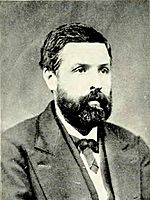Cyrus C. Carpenter facts for kids
Quick facts for kids
Cyrus Clay Carpenter
|
|
|---|---|
 |
|
| Member of the U.S. House of Representatives from Iowa's 9th district |
|
| In office March 4, 1879 – March 3, 1883 |
|
| Preceded by | S. Addison Oliver |
| Succeeded by | William H. M. Pusey |
| 8th Governor of Iowa | |
| In office January 11, 1872 – January 13, 1876 |
|
| Lieutenant | Henry C. Bulis Joseph Dysart |
| Preceded by | Samuel Merrill |
| Succeeded by | Samuel J. Kirkwood |
| Member of the Iowa State Legislature | |
| In office 1884–1886 |
|
| Personal details | |
| Born | November 24, 1829 Harford Township, Pennsylvania |
| Died | May 29, 1898 (aged 68) Fort Dodge, Iowa |
| Resting place | Oakland Cemetery Fort Dodge, Iowa |
| Political party | Republican |
| Spouse | Susan C. Burkholder |
| Profession | Teacher Surveyor |
| Signature | |
Cyrus Clay Carpenter (born November 24, 1829 – died May 29, 1898) was an important American leader. He served as an officer during the American Civil War. Later, he became the eighth Governor of Iowa. He also represented Iowa in the U.S. House of Representatives.
Contents
Early Life and Education
Cyrus Clay Carpenter was born near Harford, Pennsylvania. He went to local schools and then graduated from Harford Academy in 1853. His parents were Asahel Carpenter and Amanda M. Thayer.
Moving to Iowa and Early Career
In 1854, Carpenter moved to Iowa. He worked as a teacher in Fort Dodge, Iowa. After that, he became a land surveyor. In 1856, he was the county surveyor for Webster County. He also studied law, but he never worked as a lawyer.
In March 1857, he joined a group that went to Spirit Lake. They helped settlers who were forced from their homes by the Sioux Indians. This happened after the Spirit Lake Massacre.
Carpenter also served in the Iowa House of Representatives. He was a member from 1858 to 1860.
Service During the Civil War
When the Civil War began, Carpenter volunteered to serve. He started as a private. On March 24, 1862, he was chosen as a captain of volunteers. He was promoted to lieutenant colonel on September 26, 1864.
On July 12, 1865, he was given the honorary rank of colonel. This was for his "efficient and meritorious services." He was in charge of supplying food and other items for Sherman's Army. This was during their famous march to the sea. He left the army on July 14, 1865. During the war, he worked with important generals like William Rosecrans and Grenville M. Dodge.
After the war, he returned to Iowa. He married Susan C. Burkholder in Fort Dodge. From 1866 to 1868, he was elected as the registrar of the Iowa state land office.
Governor and U.S. Representative
In 1871, Cyrus Carpenter ran for Governor of Iowa as a Republican. He won his first two-year term. He was re-elected in 1873 and served until early 1876.
After being governor, he was appointed as the Second Comptroller of the Treasury for the United States. He worked in this role for two years, from January 1876 to September 1877. On March 26, 1878, he became a railroad commissioner for Iowa.
In 1878, Carpenter was elected to the U.S. House of Representatives. He represented Iowa's 9th congressional district. He served one term and was re-elected in 1880. He did not run for re-election in 1882. Overall, he served in Congress from March 4, 1879, to March 3, 1883.
Later Life and Legacy
In 1883, Carpenter ran for the Iowa House of Representatives again. He won and served another two-year term, from 1884 to 1886.
After his time in Washington, D.C., he returned to Fort Dodge. He served as the postmaster of Fort Dodge from 1889 to 1893. He also managed his farm and worked in real estate.
Cyrus Clay Carpenter passed away in Fort Dodge on May 29, 1898. He was buried in Oakland Cemetery in Fort Dodge.

